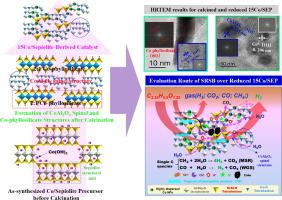Our official English website, www.x-mol.net, welcomes your
feedback! (Note: you will need to create a separate account there.)
Influence of CoAl2O4 spinel and Co-phyllosilicate structures derived from Co/sepiolite catalysts on steam reforming of bio-oil for hydrogen production
Fuel ( IF 6.7 ) Pub Date : 2020-11-01 , DOI: 10.1016/j.fuel.2020.118449
Yishuang Wang , Chunsheng Wang , Mingqiang Chen , Jiaxin Hu , Zhiyuan Tang , Defang Liang , Wen Cheng , Zhonglian Yang , Jun Wang , Han Zhang
Fuel ( IF 6.7 ) Pub Date : 2020-11-01 , DOI: 10.1016/j.fuel.2020.118449
Yishuang Wang , Chunsheng Wang , Mingqiang Chen , Jiaxin Hu , Zhiyuan Tang , Defang Liang , Wen Cheng , Zhonglian Yang , Jun Wang , Han Zhang

|
Abstract Extensive attentions have been paid to develop steam reforming of bio-oil, which was considered as one of the sustainable technologies for producing eco-friendly next-generation energy sources, such as syngas and hydrogen. In this work, the novel catalysts consisted of CoAl2O4 spinel and Co-phyllosilicate are facilely manufactured from xCo/Sepiolite (xCo/SEP) precursors and their catalytic performance has been studied in steam reforming of simulated bio-oil (SRSB). The effects of Co content on the microstructures and physicochemical properties of catalysts are analyzed by various characterizations such as N2 adsorption-desorption, XRD, FTIR, H2-TPR, HRTEM and XPS. The results reveal that the CoAl2O4 phases in these catalysts are evolved gradually from Co-lean nonstoichiometric Co1−xAl2O4−x to Co-rich CoAl2O4 structure with increasing Co loading, subsequently accompanying with the formation Co-phyllosilicate species (CPS) when the Co content exceeds 10 wt%. Among them, calcined 15Co/SEP sample with optimal configuration of Co-Al spinel and CPS leads to its reduced-counterpart possesses fine Co metal nanoparticles, abundant defective Co-Al-spinel and metal-support interface sites. It therefore presents the highest carbon conversion (95.7%) and H2 yield (68.8%) in activity experiment and a slight deactivation in 50 h of stability test during SRSB. The analyses of TG-DSC, XRD and HRTEM are conducted on used catalysts and discover xCo/SEP-derived catalysts exhibit promising coke resistance and metal sintering is the major issue for catalyst deactivation, which mainly caused by particle migration and coalescence mechanism due to the further reduction of CPS.
中文翻译:

Co/海泡石催化剂衍生的CoAl2O4尖晶石和Co-页硅酸盐结构对生物油水蒸汽重整制氢的影响
摘要 生物油蒸汽重整被认为是生产合成气和氢气等生态友好型下一代能源的可持续技术之一,受到广泛关注。在这项工作中,由 CoAl2O4 尖晶石和 Co-页硅酸盐组成的新型催化剂由 xCo/海泡石 (xCo/SEP) 前体轻松制备,并研究了它们在模拟生物油 (SRSB) 的蒸汽重整中的催化性能。通过N2吸附-解吸、XRD、FTIR、H2-TPR、HRTEM和XPS等多种表征手段,分析了Co含量对催化剂微观结构和理化性能的影响。结果表明,随着 Co 负载量的增加,这些催化剂中的 CoAl2O4 相从 Co-lean nonstoichiometric Co1−xAl2O4−x 逐渐演变为富 CoCoAl2O4 结构,随后伴随 Co超过 10%。其中,具有最佳配置的 Co-Al 尖晶石和 CPS 的煅烧 15Co/SEP 样品导致其还原配对物具有精细的 Co 金属纳米粒子、丰富的缺陷 Co-Al-尖晶石和金属-载体界面位点。因此,它在活性实验中表现出最高的碳转化率 (95.7%) 和 H2 产率 (68.8%),并且在 SRSB 期间的 50 小时稳定性测试中表现出轻微的失活。TG-DSC的分析,
更新日期:2020-11-01
中文翻译:

Co/海泡石催化剂衍生的CoAl2O4尖晶石和Co-页硅酸盐结构对生物油水蒸汽重整制氢的影响
摘要 生物油蒸汽重整被认为是生产合成气和氢气等生态友好型下一代能源的可持续技术之一,受到广泛关注。在这项工作中,由 CoAl2O4 尖晶石和 Co-页硅酸盐组成的新型催化剂由 xCo/海泡石 (xCo/SEP) 前体轻松制备,并研究了它们在模拟生物油 (SRSB) 的蒸汽重整中的催化性能。通过N2吸附-解吸、XRD、FTIR、H2-TPR、HRTEM和XPS等多种表征手段,分析了Co含量对催化剂微观结构和理化性能的影响。结果表明,随着 Co 负载量的增加,这些催化剂中的 CoAl2O4 相从 Co-lean nonstoichiometric Co1−xAl2O4−x 逐渐演变为富 CoCoAl2O4 结构,随后伴随 Co超过 10%。其中,具有最佳配置的 Co-Al 尖晶石和 CPS 的煅烧 15Co/SEP 样品导致其还原配对物具有精细的 Co 金属纳米粒子、丰富的缺陷 Co-Al-尖晶石和金属-载体界面位点。因此,它在活性实验中表现出最高的碳转化率 (95.7%) 和 H2 产率 (68.8%),并且在 SRSB 期间的 50 小时稳定性测试中表现出轻微的失活。TG-DSC的分析,







































 京公网安备 11010802027423号
京公网安备 11010802027423号